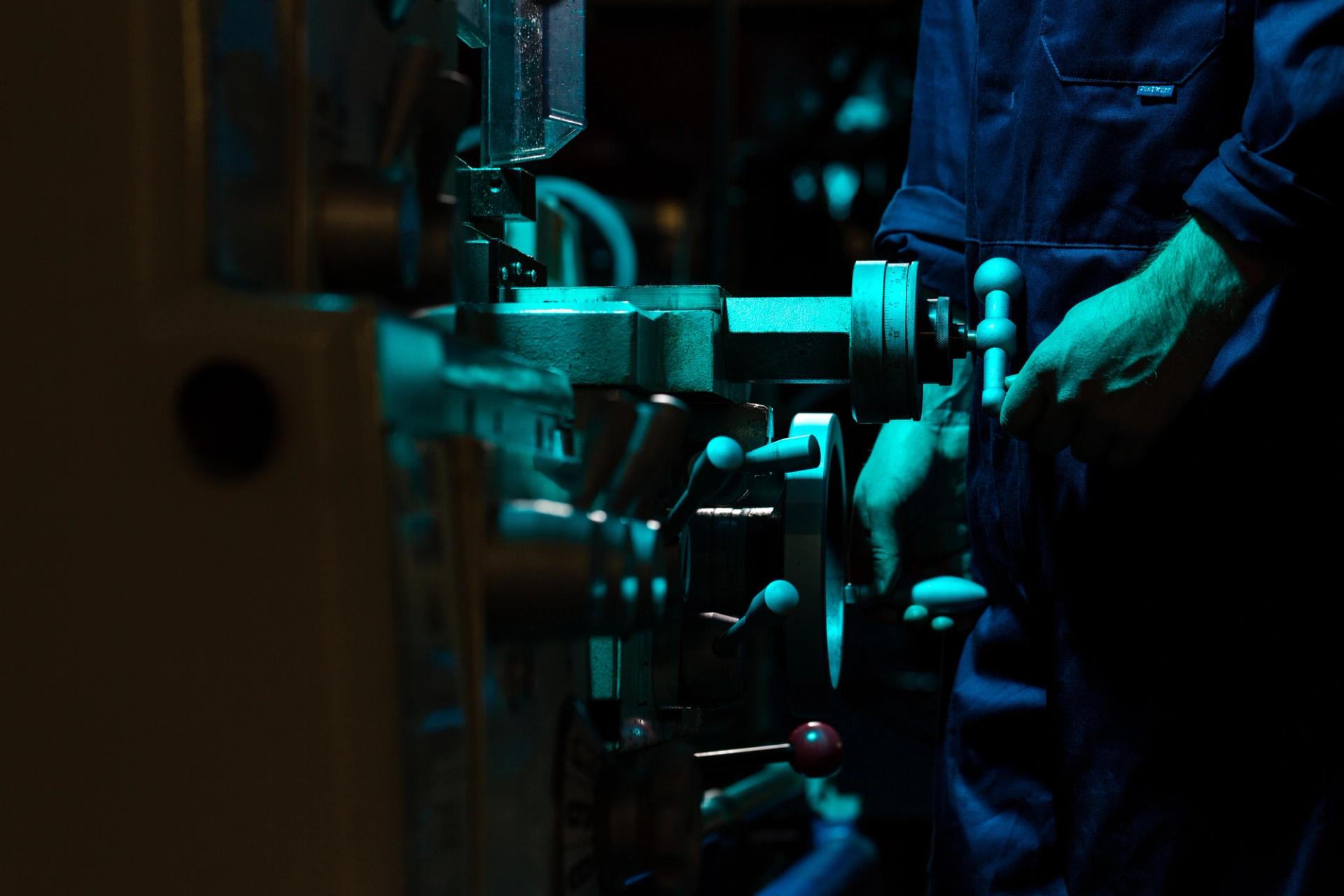The 7 big challenges for the German mechanical engineering industry
March 12, 2021
- New Insight

Frankfurt, 12.03.2021. The medium-sized German mechanical engineering sector appears to be struggling - even before the pandemic. The reason: Due to the good order situation in the past decade, many important trends were noted but not implemented. And so today there is a lack of know-how at the same time as increasing price pressure. Karsten Schulze, partner and mechanical engineering expert at the management consultancy FTI-Andersch, and Professor Dr.-Ing. Gisela Lanza, head of the Production Systems Department at the wbk Institute of Production Engineering at the Karlsruhe Institute of Technology (KIT), describe the most important trends in industry from today's perspective and show what machine builders must do now to make up for strategic deficits.
Challenge 1: Business models and products have to be reinvented - otherwise the competition will do it
The initial situation: The design, construction and sale of machines represent the functional business model of German machine manufacturers to date. "Other business models such as leasing, subscription or additive services have been rare," says Karsten Schulze of FTI-Andersch. Additive services account for an average of one-fifth of sales. "These are almost exclusively maintenance contracts for the machines sold."
The problem: In the consumer sector, models away from the classic purchase are increasingly gaining acceptance: whether for cars, mobile phones or now even heating systems. Karsten Schulze says: "Experience shows: What starts as a trend in the consumer sector and becomes established, also takes place in the Business-2-Business (B2B) context with a time lag. Although there have been ideas about this for over ten years, in reality many machine manufacturers have hardly dealt with the new business models required for this. This also includes, for example, the development of data-driven additional services in order to set themselves apart from cheaper competitors. With the increased cost pressure, especially in the last 24 months, redefining sales and development models is not getting any easier."
What to do now: "Instead of continuing to optimise every screw, German machine manufacturers need to look at the big picture," says Karsten Schulze. "The price competition, especially with Asia, cannot be won. It is now a matter of examining which new business models and additional services can provide opportunities for differentiation beyond machine quality and price. In this context, it can also make sense to join forces with local complementary suppliers in digitization and transformation alliances. Not every SME needs to develop its own platforms and models - this is how efficiencies can be leveraged."
Challenge 2: Without cooperation it is no longer possible - always with the risk that the previous friend becomes a competitor
The starting position: Collaboration with companies in the IT and technology sector in the USA as well as in Asia is also becoming essential for German machine builders, especially in the course of the digitalization of their machines and the need to redefine their business models and develop new, digital services outlined here. Karsten Schulze says: "Building up internal know-how independently today - it is too late for that. Global cooperations are necessary in order not to lose the connection."
The problem: The new cooperation partners learn quickly and a lot. They often have a more agile structure than classic industrial companies. Karsten Schulze says: "The probability that a software company will also succeed in developing the necessary hardware tomorrow is significantly greater than the other way around. Due to the agile thinking and organizational structures of these companies, it is also easier for them to develop new business models and implement them very quickly. Thus, friends can quickly become enemies - also referred to in modern terms as 'frenemies'." The German mechanical engineering industry has not yet found a way to deal adequately with this new form of collaboration.
What to do now: Karsten Schulze says: "You have to face the truth. German machine builders are dependent on this cooperation. They can hardly do anything about this imbalance on their own. The fact that their new cooperation partners are much less regulated internationally is an aggravating factor. It would take a concerted industry initiative, nationally or even at the European level, to introduce clear, legally binding rules. Since this doesn't seem very likely, German machine builders will have to live with the risk and learn a lot from their counterparts in return: if they manage to understand and internalize the agility used there, they can use it to change their own organizations as well."
Challenge 3: Data must become an integral part of value creation - new providers are often ahead of the traditional industry
The starting position: A large amount of data is generated along the value chain. This forms a strategic resource for companies, offering many potentials ranging from price optimizations to deeper customer understanding. "The topic of 'Big Data' has been known for more than ten years," says Professor Gisela Lanza from the Karlsruhe Institute of Technology (KIT).
The problem: "However, German mechanical engineers in particular have only rarely succeeded in really making something out of it," says Lanza. "Data is collected incorrectly or not at all, and is not evaluated and processed in a systematic way. That's why no relevant conclusions are drawn from it, let alone developing their own business models on the basis of it. Thetruth is: Despite the immense competition and price pressure, the last decade has been very good in the German mechanical engineering sector. Investments were put on the back burner in this context, too, and the focus was instead on increasing output in familiar territory. That is now taking revenge, because now the know-how is missing."
What to do now: "There is no alternative to investing right now," says Gisela Lanza. "If only because the new competition from Asia has just built new plants and production lines in recent years, has developed products directly digitally - and now has the technological prerequisites to develop the data for its own process optimization but also for the development of data-driven business models." German machine builders must now, on the one hand, create the technological prerequisites and, on the other hand, quickly build up the necessary know-how. Lanza advises, "Develop a strategy. But also, quite pragmatically, just get started. Define the most important data points, evaluate them, experiment with them. Now."
Challenge 4: Product development must be rethought - completely focused on customer benefits
The initial situation: German machine builders develop the best technical solution, which has so far often sought a demand market itself. "In the process, many machines were and are built at a level of value in terms of quality that is not actually required by the customer," says Karsten Schulze. "There is still the self-developed screw, which is above all expensive, but not efficient. And there are ranges available in a breadth that lead to far too much complexity - and thus significantly reduce the margin."
The problem: Across industries, the idea of thinking about one's products from the customer's perspective is in its early stages. "Once again, the pioneers are the manufacturers of consumer goods," Schulze says. "They're looking at: What does the customer want? What does he need for that? And how can that be manufactured efficiently? Machine manufacturers often start from an abstract problem that they try to solve in the best possible way - and make this the basis for development. With increasing price pressure, however, only a focus offers the possibility of maintaining or even temporarily expanding margins. Then you don't need the special screw, but standardized subcontracting."
What to do now: Machine builders need to rethink the development process. "Instead of developing in the abstract, they should be in constant dialogue with their customers and develop specifically to meet their needs," says Karsten Schulze. "By the way, that doesn't mean offering twenty variants instead of ten in the future. On the contrary: customers often don't even need that level of detail. New management concepts such as 'design thinking' can help not only consumer electronics suppliers but also mechanical engineers to rethink development."
Challenge 5: 'Green Tech' must be played out as a strength and occupied in the long term - competitors have long since followed suit
The starting position: Ecological and economic sustainability is one of the global megatrends that will also accompany the next decades. Due to the international perception that Germany is a very 'green' country, local mechanical engineering companies in particular have the opportunity to benefit.
The problem: Gisela Lanza says, "But environmental regulations are also continuing to tighten worldwide, forcing international suppliers to become more sustainable. Today's competitive advantages could quickly melt away."
What to do now: The researcher and expert recommends that German companies develop an explicit strategy such as sustainable products and sustainable processes. "Continuous investments in green technologies and a self-chosen, permanent undercutting of existing limits can secure the sustainable competitive advantage," says Gisela Lanza. "Companies in the automotive industry, for example, are setting an example: there, some manufacturers are voluntarily committing to rely exclusively on electric technology in ten years' time. Such a visionary attitude could also be and become an important differentiation criterion for German machine builders towards international competition."
Challenge 6: Building up expertise in blockchain will be indispensable - even if the fields of application are initially limited
The starting point: Blockchain-based technologies are changing many products, services and business models. In practice, however, blockchain plays almost no role in German mechanical engineering today. “Many machines today work digitally, but they are not 'smart'. That is why the use case is often missing so far, ”says Dorothée Fritsch, blockchain expert at FTI-Andersch.
The problem: Smart machines are being developed. With the help of blockchain technology, their activities could be logged in a tamper-resistant manner in the future. This will be the case in particular in the case of the transfer or leasing of a machine or the procurement of a service. Dorothée Fritsch says: “At the moment, however, the machine purchase model still dominates.” Because the current use cases are largely lacking, there have been few relevant applications on the market at the same time.
What to do now: If the business model changes, blockchain will automatically play a role. If the 'smart' machine and the new model are now conceived without this new technological option, on the one hand an important future technological competence is missing. On the other hand, subsequent integration will be complex, complicated and therefore also more expensive. Machine builders should therefore already check at which point they can invest in building up know-how and, more specifically, in blockchain prototypes, docked to their own machine range and business model. Those who choose to make this additional investment acquire an important competitive advantage. “Blockchain is well beyond the hype status,” says Dorothée Fritsch. "It will be relevant for all industries, even if the depth of application and the respective times are not yet clear."
Challenge 7: Building resilient production networks requires investment - essential, despite no direct ROI
The initial situation: "Whether it's the current pandemic, but also environmental disasters, raw material bottlenecks or political upheavals before that - international supply chains are more susceptible to disruption than ever before," says Gisela Lanza. "This is also due to the fact that they have never been as complex and truly international in their division of labor as they are today. If there are disruptions, this is accompanied by considerable costs for all those involved in these chains."
The problem: The establishment of new suppliers, contingency plans, a new logistics concept, an automated supply chain - all of these involve not inconsiderable investments. Lanza: "What all the trends outlined here have in common is that they generate high costs in the short term that only pay off in the long term. And this is happening at a time when many companies have lost important liquidity not only because of the pandemic, but also in the previous year. Many prefer to close both eyes. Until it's too late and the one important supplier can't or won't deliver anymore."
What to do now: German machine builders need to take intensive preventive action when dependency is high. Gisela Lanza says: "It is important to identify: Where are the main bottlenecks? What are the biggest dependencies? Where are there alternatives? How can these be built up? Even if it takes time and money: Those who do not set up strategic redundancies and flexible concepts for capacity shifting have a realistic chance today of paying very dearly for this one day. The basic prerequisites for this are increasing factory standardization and optimized factory flow analyses."
About FTI-Andersch:
FTI-Andersch is a management consultancy that supports its clients in the development and implementation of sustainable future/performance and restructuring concepts. FTI-Andersch is active in situations in which companies have to deal with operational or financial challenges – or even well before that, in order to align the business model, organisation and processes in a future-oriented manner at an early stage. A special focus is the preparation of independent decision-making bases for intended (re-)financing.
Clients include, in particular, medium-sized companies and corporations that operate internationally.
FTI-Andersch is part of the internationally active FTI Consulting Group (NYSE: FCN) with more than 5,500 employees.
About the Production Systems Department of the wbk Institute of Production Engineering at the Karlsruhe Institute of Technology (KIT):
The production systems division of the wbk Institute of Production Technology focuses its research and practice on the topics of global production strategies, production system planning and quality assurance. The overarching goal here is to plan, evaluate and control the effects of tomorrow's production - from the global, shock-robust network to the breathing factory with highly productive means of production and innovative business models to quality assurance of immature processes. Specifically, new scientific methods are researched and practical tools for industry are developed, individually adapted to industrial needs and thus transformed into entrepreneurial success.
Your Contacts
 Karsten Schulze
Karsten SchulzeSenior Partner & Member of the Board
 Dorothée Fritsch
Dorothée FritschHead of Business Development & Strategy